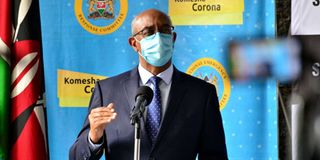Kenya records 271 new Covid-19 cases as recoveries rise to 17,368

Health Chief Administrative Secretary Rashid Aman.
What you need to know:
- In the same period, five more patients succumbed to the disease, raising the total Covid-19 deaths in Kenya to 487.
Kenya has Tuesday recorded 271 new Covid-19 cases from over 4,019 samples tested in last 24 hours raising the total caseload to 30,636.
While making the announcement during the daily briefing in Nairobi, Health CAS Rashid Aman also said that another 208 patients had recovered from the virus, bringing the country’ total recoveries to 17,368.
Dr Aman announced 166 of the patients were discharged from the home-based care programme and 42 from various hospitals across the country.
In the same period, five more patients succumbed to the disease, raising the total Covid-19 deaths in Kenya to 487.
As of August 18, the country had tested a total of 398,585 samples for the coronavirus.
Of the 271 new patients, 267 were Kenyans and four foreigners, 178 male and 93 female, the youngest a year old and the oldest 80.

Nairobi accounted for 149 of the new cases, Kiambu (23), Kajiado (14), Mombasa (10), Machakos (9) and Garissa (9).
New cases were also recorded in Narok (7), Nyeri (7), Kilifi (3), Busia (4), Murang’a (2), Laikpia (2), Kitui (2). Kisumu, Kwale and Uasin Gishu counties recorded a case each.
During the briefing, the Health officials warned that the decreasing coronavirus cases do not indicate flattening of the curve.
Dr Aman cautioned Kenyans not to be overly optimistic that the worst is over even as daily new cases plunge.
“It is too early to be able to make any determination that the curve is dropping. There are many factors which determine flattening of the curve,” he said, adding that the tests being done are also varying and do not give a clear picture of the curve.

Kenya’s positivity rate, he said, is still high despite the seemingly decreasing numbers of new infections.
According to Dr Francis Kuria, the Head of Public Health, there are other parameters to be considered in determining flattening of the curve.
These include the number of cases still in hospitals and deaths.
“If there is reduction in case fatalities and the number of cases still in hospitals, then we may say the curve is flattening,” he said.
According to Dr Rashid, there is need to re-evaluate testing strategies because of the widespread transmission of Covid-19, to focus on particular groups and institutions.





